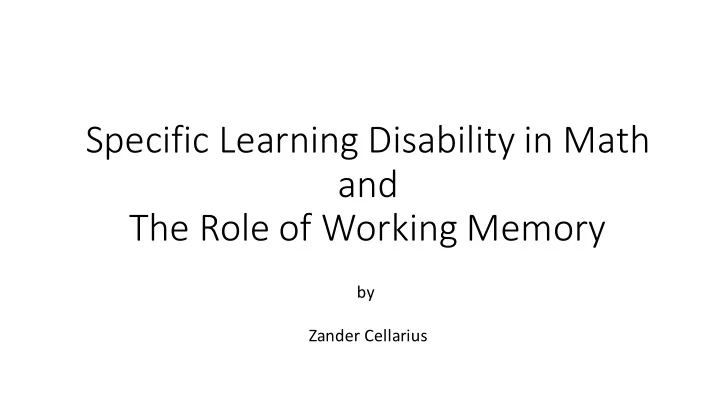

Specific Learning Disability in Math and The Role of Working Memory by Zander Cellarius
Working Memory • What is it? • How does it relate to math?
Working Memory (WM) • What is it? • “Working memory refers to the system or systems that are assumed to be necessary in order to keep things in mind while performing complex tasks such as reasoning, comprehension and learning.” (Baddeley, 2010) • How does it relate to math and learning math skills?
Working Memory • What is it? • How does it relate to math and learning math skills? Ø Central executive: Sequencing operations, coordinating the flow of information, and guiding decision-making (Baddeley 1998) Ø Phonological loop: Retaining and storing information about complex problems (Furst & Hitch, 2000) Ø Visuo-spatial Sketchpad: Unclear, but implicit in multi-digit operations, algebra & geometry (Meyer et al., 2010) • Appears that WM component contributions may vary throughout school career (Meyer et al., 2010)
Working Memory and New Information
Working Memory • WM is a strong predictor of academic success • WM is highly heritable • Up to 80% of children with WM in the bottom 10 th percentile demonstrate difficulty in reading, mathematics, or both Holmes et al. 2009
Key Math-3
Working Memory Interventions • Working memory predicted reading achievement & math ability, especially word problems (Lee and Beebe-Frankenberger, 2004) • So let’s underpin working memory
Cogmed • Developed under Dr. Klingberg and used in two studies • The first commercial launch in 2003 in Sweden • Claims sustained improvement in: • Working memory • Attention • Reading & math • Brain injury symptom alleviation • Cognitive control • Links improved working memory to general life skills such as planning, organization, academics Cogmed, 2015
Increased Working Memory Increased à à Academic Intervention Cognitive Performance Functions Cogmed, 2015
• After a Cogmed intervention, subsequent improvement in math performance was found 6 months later in the group that received intervention (Holmes, Gathercole & Dunning, 2009) • Improved Basic Number Skills test score after intervention using Cogmed (Dahlin, 2013) • Increase in arithmetic ability after intervention (Bergman-nutley and Klingberg, 2014) • Performance on both reading and math to be positively impacted after completion of Cogmed (Soderqvist and Nutley, 2009)
Critiques • Lack of sufficiently powerful results to be able to generalize effects of Cogmed (Shipstead et al., 2012) • Isolated finding for increase in mathematical performance (Shipstead et al., 2012) • Critiques to the design of studies used to promote Cogmed efficacy (Hulme and Melby-Lervag, 2012)
References Baddeley, A. (2010). Working memory. Current Biology , 20 (4), R136–R140. http://doi.org/10.1016/j.cub.2009.12.014 • Baddeley, A., Gathercole, S., & Papagno, C. (1998). The phonological loop as a language learning device. Psychological Review , 105 (1), 158– • 173. Bergman-nutley, S., & Klingberg, T. (2014). Effect of working memory training on working memory, arithmetic and following instructions. • Psychological Research , 78 (6), 869–77. http://doi.org/http://dx.doi.org.ezproxy.lib.ucalgary.ca/10.1007/s00426- 014-0614-0 Dahlin, K. I. E. (2013). Working Memory Training and the Effect on Mathematical Achievement in Children with Attention Deficits and • Special Needs. Journal of Education and Learning , 2 (1), 118. FÜrst, A. J., & Hitch, G. J. (2000). Separate roles for executive and phonological components of working memory in mental arithmetic. • Memory & Cognition , 28 (5), 774–782. http://doi.org/10.3758/BF03198412 Holmes, J., Gathercole, S. E., & Dunning, D. L. (2009). Adaptive training leads to sustained enhancement of poor working memory in • children. Developmental Science , 12 (4), F9–F15. http://doi.org/10.1111/j.1467-7687.2009.00848.x
Hulme, C., & Melby-Lervåg, M. (2012). Current evidence does not support the claims made for CogMed working memory training. • Journal of Applied Research in Memory and Cognition , 1 (3), 197–200. http://doi.org/10.1016/j.jarmac.2012.06.006 Lee, H., & Beebe-Frankenberger, M. (2004). The Relationship Between Working Memory and Mathematical Problem Solving in • Children at Risk and Not at Risk for Serious Math Difficulties. Journal of Educational Psychology , 96 (3), 471–491. http://doi.org/10.1037/0022-0663.96.3.471 Meyer, M. L., Salimpoor, V. N., Wu, S. S., Geary, D. C., & Menon, V. (2010). Differential contribution of specific working memory • components to mathematics achievement in 2nd and 3rd graders. Learning and Individual Differences , 20 (2), 101–109. http://doi.org/10.1016/j.lindif.2009.08.004 Shipstead, Z., Hicks, K. L., & Engle, R. W. (2012). Working memory training remains a work in progress. Journal of Applied Research in • Memory and Cognition , 1 (3), 217–219. http://doi.org/10.1016/j.jarmac.2012.07.009 Soderqvist, S., & Nutley, S. B. (2015). Working Memory Training is Associated with Long Term Attainments in Math and Reading. • Frontiers in Psychology . Retrieved from http://go.galegroup.com/ps/i.do?id=GALE%7CA448813945&v=2.1&u=ucalgary&it=r&p=HRCA&sw=w&asid=67ec9e5714e beb296ff7f9c8b84b925f
Recommend
More recommend